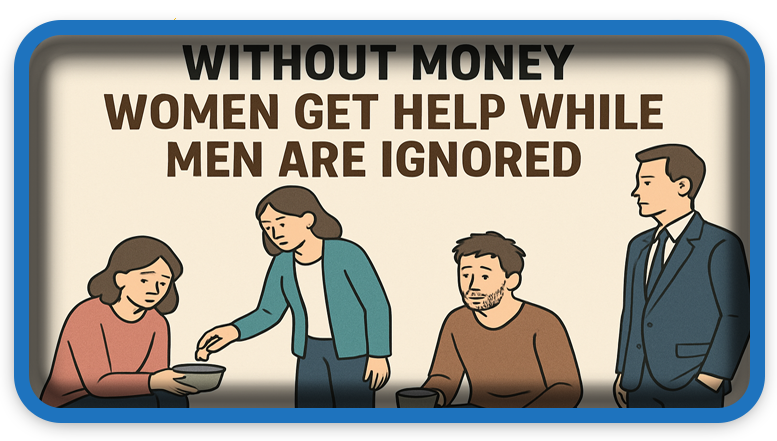⏲️ Estimated reading time: 5 min
Why Women Without Money Get Help While Men Without Money Are Ignored. Society reacts differently to financial struggles for people of all genders. Women often attract compassion and support, while men without money usually face rejection or indifference. This article explains why, explores the consequences, and suggests ways to rethink human value beyond wealth.
Money represents more than survival; it measures status and influence. Yet, society reacts to poverty in men or women in opposite ways. When a woman lacks money, people sympathize and often provide support. When a man lacks money, others frequently reject or ignore him.
This double standard stems from cultural traditions, gender expectations, and centuries of conditioning. In this article, we will examine the reasons behind it, how men or women experience it, the effect on relationships, and what we can do to balance the situation.
1. The Roots of Gendered Financial Perception
Throughout history, gender roles shaped the expectations:
- Men as providers and protectors. Their worth was tied to the resources they could bring to their families or communities.
- Women as nurturers and caregivers. Their worth was tied to their ability to create and maintain family and social bonds.
As a result, even today, a man without money is seen as failing his “primary role,” while a woman in the same situation is seen as someone to be protected or supported.
2. Why Women Without Money Receive More Help
There are several reasons why women are offered support when they face financial hardship:
- Protective instinct in men – Many men feel a sense of duty to protect and provide for women, especially those in vulnerable situations.
- Perception of female fragility – Women are often viewed as more vulnerable and in need of assistance.
- Physical and emotional appeal – Men may be motivated by attraction, consciously or unconsciously, when offering help.
- Stronger social safety nets for women – Women tend to receive more community and family support compared to men.
3. Why Men Without Money Are Ignored
The opposite applies to men, and the difference is striking:
- Cultural pressure – Men are expected to be providers. Without money, they are considered failures.
- Association with laziness or weakness – A poor man is often assumed to lack ambition, effort, or intelligence.
- Female selectiveness in dating – Studies show women prioritize financial stability more than men do when choosing partners.
- Lack of compassion for men – Men’s struggles rarely inspire charity or widespread social support compared to women’s struggles.

4. Impact on Relationships
This difference has direct consequences on modern relationships:
- This double standard shapes relationships dramatically:
- Men feel constant pressure to deliver resources, even when they excel in loyalty or emotional support.
- Women retain social validation. Even when they struggle financially, men still find them desirable.
- Marriage dynamics change. A woman often receives support from her partner, while a man who loses income risks abandonment.
5. Real-Life Examples
- Dating apps: Men with low income or unstable careers receive fewer matches, while women in the same situation often still receive attention.
- The “hypergamy” phenomenon: Many women look for partners who are financially better off, reinforcing the expectation that men must always earn more.
- Social reality: A broke woman can usually find housing, financial help, or emotional support. A broke man risks ending up alone.
6. The Psychology of a Man Without Money
A man who lacks financial resources often experiences:
- Shame – for failing to meet societal expectations.
- Isolation – because help is rarely offered.
- Depression and anxiety – linked to the belief that he has no value without money.
- Risk-taking behavior – some men turn to overworking, gambling, or even crime to compensate.
7. The Psychology of a Woman Without Money
For women, the psychological experience is different:
- Compassion from others – which lowers stress.
- Support from men – who feel compelled to “rescue” or provide.
- Ability to choose – as their financial struggles don’t significantly reduce their desirability to men.

8. What This Double Standard Reveals About Life
The harsh truth is that:
A man’s value in modern society is tied to what he produces, while a woman’s value is tied to what she represents.
This isn’t an absolute rule, but in 99% of cases, it plays out in exactly this way.
9. Possible Solutions
- Promote real equality. Not just in theory, but in how we perceive worth.
- Support campaigns for struggling men. Just as many exist for women.
- Encourage women to value non-financial traits in men. Such as loyalty, character, and emotional stability.
- Educate all genders. To understand that money alone should not define human value.
10. Lessons We Can Learn
- Men must understand that financial success does not define their entire worth, though society pressures them otherwise.
- Women could reflect on the importance of loyalty and support in tough times rather than focusing solely on financial capacity.
- Society must break the stigma that men struggling financially are failures.
🔎 Closing Thoughts
Society often helps women without money while leaving men to struggle alone. This imbalance reflects tradition, cultural roles, and stereotypes, not fairness.
We cannot erase centuries of conditioning overnight, but we can start rethinking value. With empathy, education, and awareness, we can build a society that judges people of all genders for their character, not their bank accounts.
🔔 For more tutorials like this, consider subscribing to our blog.
📩 Do you have questions or suggestions? Leave a comment or contact us!
🏷️ Tags: gender roles, money and relationships, men vs women, financial struggles, social reality, psychology of men, psychology of women, dating and money, double standards, modern relationships
📢 Hashtags: #reallife, #men, #women, #relationships, #money, #society, #psychology, #mindset, #equality, #truth
Only logged-in users can submit reports.
Discover more from HelpZone
Subscribe to get the latest posts sent to your email.

